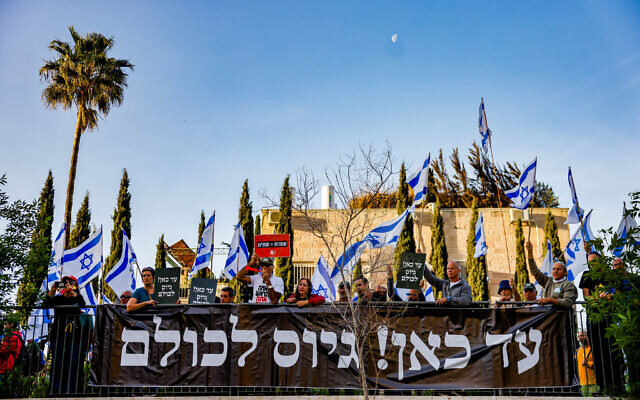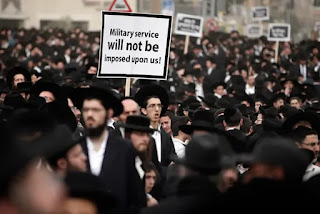 | ||
| 40% of officers training graduates defined themselves as religiously observant so daily joint prayers are held in nearly every medium to large base. PM |
***The Lies And Hyperbole Of The Ultra-Orthodox Rabbis From The USA To Israel***
The rabbis’ letter stated that pressures to increase Haredi participation are part of a “malicious plan” to “gather under their control” the Haredi public — the text does not explain whose control — and “reduce the number of those who observe” the commandments of the Torah.
Shas rabbis spurn compromise on Haredi draft following High Court ruling
As Netanyahu pursues deal with parties, letter by prominent figures with ties to Shas contradicts apparent flexibility that set Sephardi faction apart from Ashkenazi counterpart
 |
Israelis
protest outside the home of Shas leader Aryeh Deri, calling for equal
conscription laws to be implemented |
Eighteen prominent rabbis associated with the Shas party and the ultra-Orthodox Sephardi movement signed onto a document rejecting any compromise on the conscription of Haredi Jews – including those who are not studying in yeshivas.
The letter, published Sunday, was undersigned by yeshiva heads and influential rabbis, including Ovadia Yosef — the son of the Chief Sephardi Rabbi Yitzhak Yosef, who is named for his grandfather, the late leader of the Shas movement and party. The document conveyed a position similar to that of the leaders of Ashkenazi Haredi society, who have rejected any compromise on the issue of military conscription of ultra-Orthodox Jews.
Secular and religious pundits criticized the letter’s message, which they said constitutes a step toward radicalization that does not reflect the wishes of most Shas voters.
“Compromise will lead to ruination,” stated the document, adding that “we will not be deterred from going to prison” and “give our souls bravely and courageously to observe our holy Torah.”
Many promoters of greater participation by Haredim in carrying the burden of national service hope for greater flexibility on the issue in Sephardi society, which is seen as less insular than its Ashkenazi counterpart. Yanki Deri, the son of Aryeh Deri, the leader of the Shas faction in the Knesset, enlisted to serve in the Israel Defense Forces in November, weeks after the outbreak of war with Hamas on October 7.
The document, titled “Clear Instructions in the Face of Rulings on Conscription,” was published as Prime Minister Benjamin Netanyahu met in Jerusalem with representatives of United Torah Judaism, the Ashkenazi Haredi party, to work out an agreement on last month’s ruling by the High Court of Justice that effectively ended the transfer of subsidies for nearly 50,000 full-time Talmud students.
The state is currently formulating its legal reaction to the ruling, which barred the government from providing funds to ultra-Orthodox yeshivas for students eligible for IDF enlistment.
The rabbis’ letter stated that pressures to increase Haredi participation are part of a “malicious plan” to “gather under their control” the Haredi public — the text does not explain whose control — and “reduce the number of those who observe” the commandments of the Torah.
The document implicitly rejected a compromise offer by Welfare Minister Yaakov Mergi of Shas from February, who proposed in an interview to honor the legally required conscription of Haredi young men who are not studying in yeshivas in exchange for enshrining the controversial exemption of those who are.
This aspect of the letter triggered considerable criticism on Sunday, including by the Movement for Quality Government, which said in a statement that the letter belies the effectiveness and genuineness of negotiations with Haredi leaders on conscription.
Spokespeople for the Shas party told Ynet that the letter surprised them. But some critics, including Shilo Freid, a reporter for the religious Zionist-linked Makor Rishon newspaper, suggested this was part of a doublespeak strategy.
“Unlike the spokespeople, the rabbis from Shas put it on the table. No ‘adapted framework’ and no conscription for those who aren’t studying Torah. These are phrases to placate non-Haredim. In reality, even those who aren’t studying shouldn’t enlist as far as they’re concerned,” Freid wrote on X.
But others suggested that the undersigned rabbis – including Moshe Maya, a senior member of the Shas Council of Torah Sages, the ultimate authority of the movement represented by the party and its Knesset faction, and fellow Council member Reuven Elbaz – are “disconnected” from their movement’s rank and file, as Yediot Aharonot columnist Chen Artzi Sror phrased it.
“Unlike Litvak and Hassidic Haredi Jews who live in a bubble, every Shasnik knows soldiers from very close up and personal. Most have family in the army. They know exactly what the worried mothers look like and pray daily for their cousin or neighbor serving in the Israel Defense Forces. That’s why the rabbis’ position is so outrageous,” she wrote, adding: “This public deserves better leaders.”
Menashe Anzi, a lecturer at Ben Gurion University on the history of Jews in the Muslim world, opined that the letter exposes an internal division within Shas.
“This is the Haredi Sephardi nucleus that was Haredi long before Shas [existed],” he wrote. “The families of Haredi rabbis, like Musafi and Ben Shimon, have been in the Haredi sphere for decades, even longer. Their audiences are Haredi Sephardi. They don’t think of the traditional Jew from Petah Tikva, but of the Haredi from Beit Yisrael,” he added, naming a Haredi neighborhood in Jerusalem.
The letter follows legal action on the conscription of Haredim, which has attracted renewed scrutiny as Israeli society grapples with the burden of the war against Hamas in Gaza and the conflict with Hezbollah in Lebanon. The army called up hundreds of thousands of reservists, most of whom have since been discharged, following the October 7 Hamas onslaught and the ensuing war in Gaza.
In their letter, the rabbis addressed the issue of state funding for yeshivas, urging philanthropists to fill the vacuum left by the High Court’s decision to order the state to freeze its funding for those institutions.
“In this fateful time, part of the measures are to deprive the livelihood of
Torah students to harm them and force them to leave to world of the
Torah,” the rabbis wrote. “We call on the donors of our people to fund
the yeshivas with all their might.”







No comments:
Post a Comment